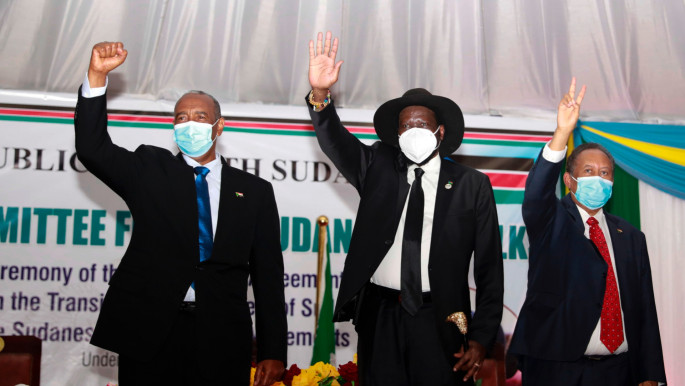Sudan's revolution and the broken promise of women's rights
In the final week of August 2020, a video of popular Sudanese female singer Asha El Jabel being violently harassed by a large group of young men shocked the nation.
Moreover, the incident raised the question of whether Sudan's transitional government is doing enough to protect women from sexual harassment.
A coalition of women's rights groups, including No To Oppression of Women Initiative, Women's Revolution Initiative and Sudanese Women, held a vigil outside the Ministry of Defence, calling for stricter penalties for perpetrators of sexual harassment and amendments to existing laws so that sexual assault has a clear and detailed definition.
After performing at a wedding celebration in the area of Al-Gadeeda Al-Thowra in Khartoum at the end of August, singer Asha El Jabel exited the house and was mobbed by a crowd of young men.
This is the first time that sexual harassment on this scale has taken place in public in Sudan, and it was even more of a shock that it happened to a well-loved figure like El Jabel.
"Asha's charisma and presence on social media have made her the trending topic for thousands of individuals, especially that she had been fairly open about her achievements such as buying a new car [and] changing her style of music, in a heart-warming way," Hala Al Karib, renowned activist, researcher and champion of women's rights in Sudan, told The New Arab.
 |
Despite the pivotal participation of women in political change in Sudan, the transitional government is yet to take serious further steps on the issue of justice and equality |  |
"Asha El Jabel's incident served as a breakthrough for us and other women to see the kinds of discrimination that women in the entertainment business experience to date," Al Karib, who is also the Regional Director of the Strategic Initiative for Women in the Horn of Africa (SIHA), added.
"Asha came out and spoke and said usually this does not happen to her and it was something very unusual, but verbal and physical harassment did take place," explains Sudanese feminist, researcher and film producer Sara Suliman, who is based between Sudan and the UK. "When it came to Asha's case people stood up because never before had a woman been harassed in this hegemonic way in Sudan."
According to Al Karib and Suliman, the number one factor that led to this crowd of men believing they could behave in this way is the patriarchal legislative system based on a Salafi interpretation of Sharia law which serves to disempower women.
 |
|
| Read more: 'Fighting for our stolen rights': Sudanese women call for social justice revolution |
This legislative system was created under the autocratic rule of deposed president Omar Al Bashir. Prior to the creation of Bashir's government in 1989, women flourished in Sudanese society and were at the forefront of civil movements, having successfully campaigned for their right to education, vote and work in the public sector.
"Understanding that the basis of sexual harassment and everyday sexism is the inequality between the sexes which is a manifestation of the everyday patriarchal discrimination against women and girls in Sudan," explains Al Karib. "Sudan is also ruled by [a] discriminatory legal system that endorses re-victimising women and girls and suppresses their access to justice."
Sara Suliman explained to The New Arab how Sudan's legal system discriminates against women and subjects them to multiple forms of harassment in practice. Suliman describes the harassment that Sudanese women are subjected to by the state as "political violence."
"The last government created Public Order Laws. These Public Order Laws had articles regarding indecent dress and indecent behaviour (Article 152). This article's definition was not clear at all. So what would happen is that you could be walking in the street and a security agent dressed in civilian clothes would come up to you and say 'your dress is indecent'," Suliman says.
"There is no exact measurement to define what is "indecent" so you may get girls wearing the hijab but these men will tell them your clothes are indecent. Some girls might be wearing trousers with a long blouse and these men will say that their clothes are indecent," she added.
 |
Sudan is ruled by a discriminatory legal system that endorses re-victimising women and girls and suppresses their access to justice |  |
"There used to be a police force and a court specifically for Public Order, and the punishment would be lashes in a public place. This was a form of control over women. The greatest number of women who would be affected by this law were women from minorities, such as the Christian minority, and female political activists."
Reporting sexual harassment to the police has been a struggle for women in Sudan. Activists complain that the police often try to persuade women to drop their complaints, and they do not have the training or know-how when it comes to dealing with victims of sexual harassment. When other women hear this, it deters them from reporting their own cases to the authorities.
In 2015 the previous government introduced a law that finally criminalised sexual harassment, however it left a lot to be desired. A new article in the 1991 Criminal Act, Article 151 (3), introduced the new offence of sexual harassment. Despite the recommendations of women's rights groups that experts should work with victims of sexual assault and these groups' willingness to provide training to the police, the new law did not reflect this, making it unclear how authorities should deal with cases of sexual assault.
Furthermore, the new act had a loophole: by remaining within the existing laws of "gross indecency" and not clearly defining what sexual harassment is, girls and women who reported sexual harassment could still be accused of committing an "indecent act" and therefore be blamed. Hence these legislative changes were two steps forward and one step back.
 |
|
| Read more: For Sudan's women, the fight against FGM has only just begun |
Moreover, it was the state that employed the use of sexual assault and rape against women during the revolution in 2019. The sit-ins were largely peaceful and Suliman, who took part in a sit-in in Khartoum, reported that there were very few incidents of sexual harassment perpetuated by male protestors.
The state's interactions with female protestors is another story, and a much more harrowing one. During the Ramadan Massacre on 3 June, 2019 a number of protestors reported seeing women sexually assaulted and raped by the RSF (Rapid Support Forces). A male protestor told the BBC in June 2019 that while hiding with a friend in a nearby building, he witnessed six soldiers rape two women.
Mental health workers reported handling dozens of cases of rape after the 2019 massacre, and doctors from the Central Committee of Sudanese Doctors reported 70 rape cases. Referring back to Suliman's term of "political violence", there is a clear trend of sexual assault and rape being used as political tools in Sudan to stop women from political participation.
"Sudanese women experienced multiple forms of sexual harassment during the six months of continuous protesting. [From] arbitrary arrests to peaceful protests women have been subjected to sexual harassment and ill-treatment by [the] then ruling government and National Intelligence Force," explains Al Karib.
 |
The government should introduce a law protecting women against sexual violence and harassment, long a central demand for women's rights groups |  |
So, has anything actually changed for women since the revolution in Sudan in 2019, a revolution that was led prominently by women?
In July 2020 the transitional government in Sudan published a set of legal amendments, including amendments to the Criminal Law Act of 1991. Amended Article 152 states that "whoever commits in a public place an act of a sexual nature or emits signals with sexual meanings that cause harassment of public feeling or public modesty, shall be punished with imprisonment for a period of six months or a fine or both."
Yet again this law is ambiguous – who is the victim and who is the perpetrator? It still allows the authorities to decide what is or isn't decent. A loophole still exists where if a girl or woman reports that they have been sexually harassed, if the policeman decides the victim had committed "an act of a sexual nature or emit[ted] signals with sexual meanings" the victim could be held at fault. Rather than being changed the law has been reworded, which is a troubling development.
 |
|
| Read more: Will Sudan's historic deal with rebels finally bring peace? |
Mohammed Osman, a researcher at Human Rights Watch who covers Sudan, believes that the transitional government in Sudan has a lot of work to do to protect women from sexual harassment and state violence.
"Despite the pivotal participation of women in political change in Sudan and the long record of abuse they endured, the transitional government is yet to take serious further steps on the issue of justice and equality," Osman tells The New Arab.
"There are problematic laws in the Penal Code, for example those concerning the dress code and public indecency are still in place, women that work as street vendors continue to be harassed by the police, the 1991 Personal Status for Muslims Act is still in place and has a lot of problematic provisions around the discriminatory guardianship system," he adds.
"I think at this stage it is imperative to say that the government should introduce a law protecting women against sexual violence and harassment; that has been a central demand for a long time for women's rights groups [in Sudan]."
"The government needs to show the will to tackle this; they should include the women's rights groups, civil societies and experts in framing a proper reaction in which the transition offers a proper space for women's rights to thrive."
Last month the transitional government declared that Sudan is to become a secular state. But does this mean it will do away with its Criminal Law Act which is based on a literalist interpretation of Sharia law? It is as yet unclear whether this development in Sudan's political history will result in the removal of laws that discriminate against women and fail to protect them from state-endorsed violence.
Yousra Samir Imran is a British Egyptian writer and author who is based Yorkshire. She is the author of Hijab and Red Lipstick, being published by Hashtag Press in the UK in October 2020
Follow her on Twitter: @UNDERYOURABAYA





 Follow the Middle East's top stories in English at The New Arab on Google News
Follow the Middle East's top stories in English at The New Arab on Google News


